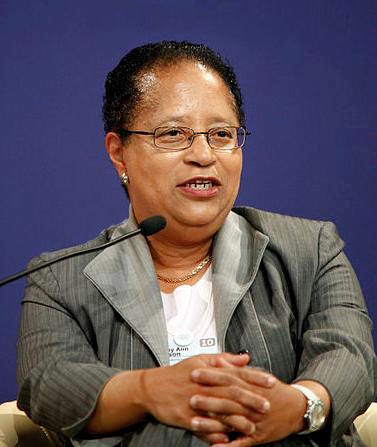Champion of Science, Diversity, and Progress
Shirley Ann Jackson
Dr. Shirley Ann Jackson, a trailblazer in physics and leadership, has built a remarkable career marked by groundbreaking research, unwavering dedication to diversity and inclusion in STEM fields, and exceptional leadership in academia and government. Here's a glimpse into her life and accomplishments:
Early Life and Education:
Born in Washington D.C., in 1946, Jackson's fascination with science began early, nurtured by her mother's storytelling and her inquisitive nature.
With encouragement from her father, she excelled academically, graduating as valedictorian of her high school.
She overcame racial and gender barriers to pursue physics at the Massachusetts Institute of Technology (MIT), graduating with a B.S. in 1968.
Defying the odds, she earned her Ph.D. in theoretical elementary particle physics in 1973, becoming the first Black woman to earn a doctorate in any field from MIT.
Research and Academic Career:
Jackson's research focused on the interaction of electrons with surfaces, contributing significantly to our understanding of superconductivity and magnetism.
She held academic positions at MIT and Rutgers University, conducting groundbreaking research and mentoring the next generation of scientists.
Her leadership in fostering diversity in STEM fields led to her founding the National Technical Association of Women (now ACT-W) and her efforts to increase the number of Black physicists in the U.S.
Government Service and Leadership:
In 1995, President Clinton appointed Jackson to chair the Nuclear Regulatory Commission (NRC), making her the first woman and first Black American to lead the agency.
She championed nuclear safety initiatives and reformed the regulatory process during her tenure, earning bipartisan respect and national recognition.
From 1999 to 2022, Jackson served as the 18th president of Rensselaer Polytechnic Institute (RPI), becoming the first Black woman to lead a major research university in the U.S.
Under her leadership, RPI's research profile, student diversity, and financial stability flourished, further solidifying her reputation as a visionary leader.
Awards and Recognition:
Jackson's exceptional contributions have been recognized through numerous awards, including the National Medal of Science, the MacArthur Fellowship, and the Benjamin Franklin Medal.
She is a fellow of the National Academy of Sciences, the American Academy of Arts and Sciences, and the American Physical Society.
In 2014, President Obama inducted her into the National Women's Hall of Fame, highlighting her achievements in breaking down barriers and inspiring others.
Beyond Recognition:
Jackson's impact extends beyond accolades. She continues to be a powerful voice for science education, diversity, and equity in STEM fields.
She serves on various boards, including the Board of Trustees of the Rockefeller Foundation, and actively inspires younger generations to pursue careers in science and technology.
Dr. Shirley Ann Jackson's story is a testament to the power of determination, intellectual curiosity, and a commitment to making a difference. Her exceptional career inspires scientists, leaders, and individuals across all backgrounds to strive for excellence and champion inclusivity in all endeavors.


